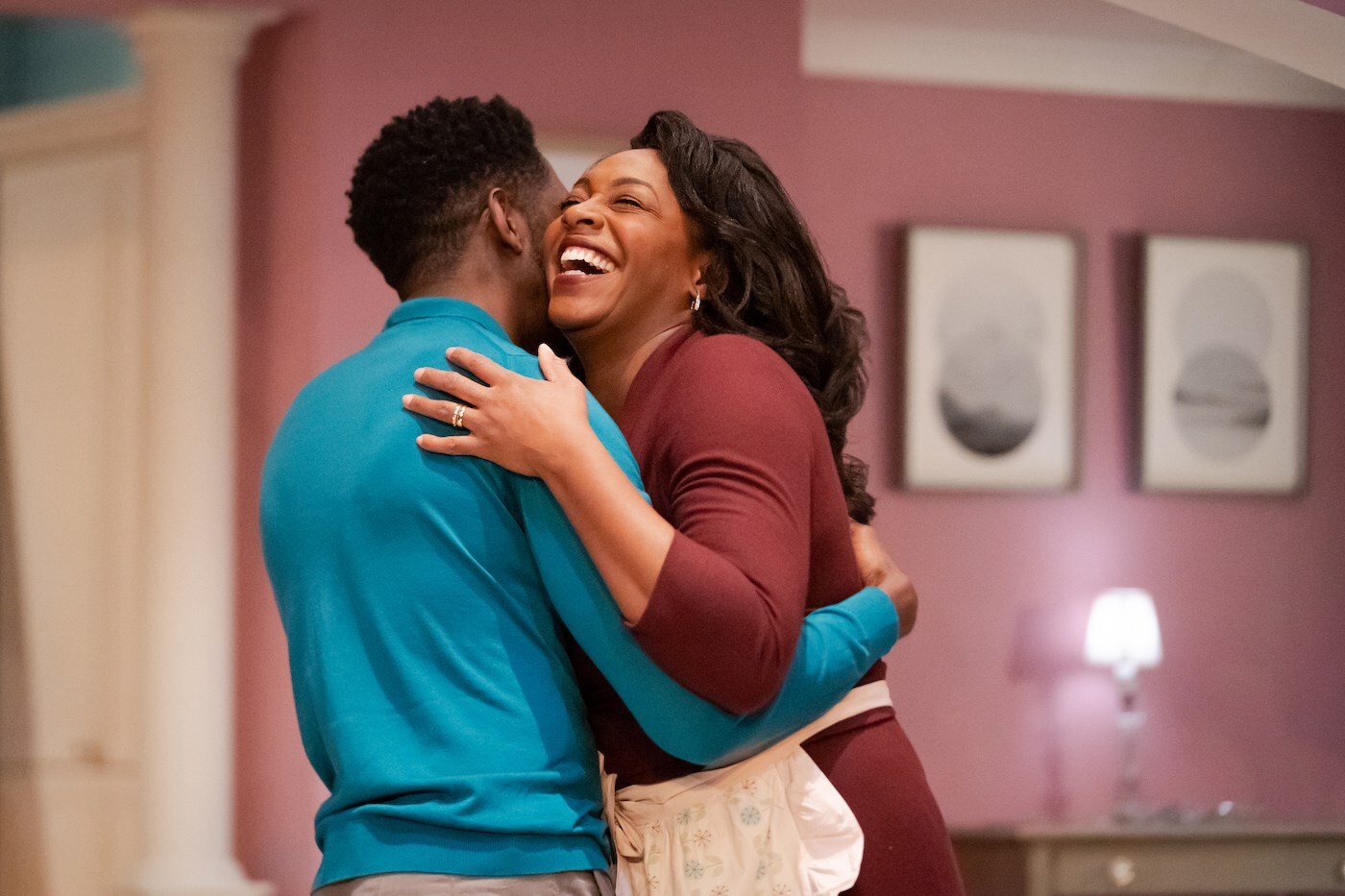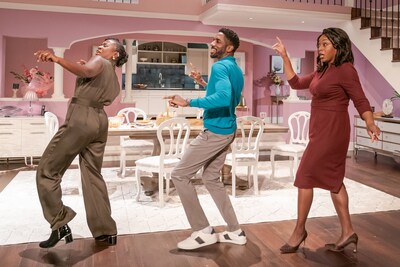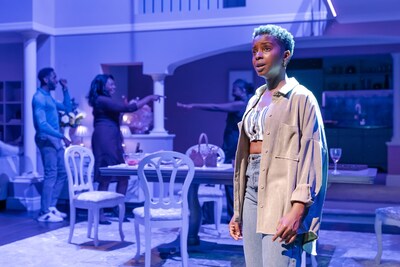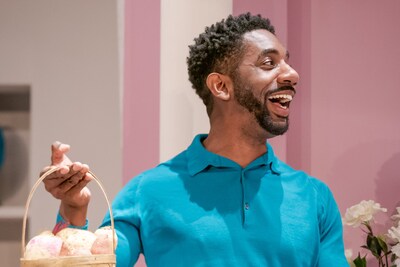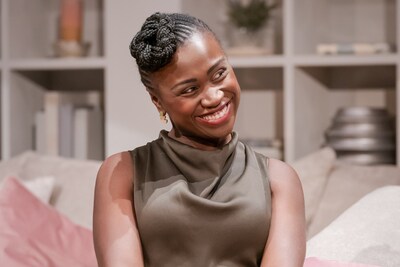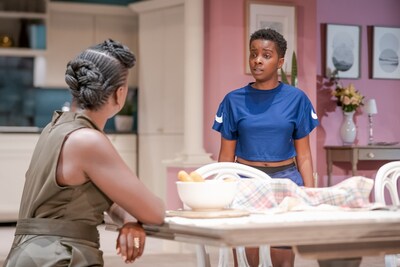Playwright Jackie Sibblies Drury and director Nadia Latif open up about their Pulitzer Prize-winning play Fairview, which has recently arrived in London, and how they are trying to diversify theatre
“Fairview is about the next stage of any conversation about race,” says Nadia Latif, director of the 2019 Pulitzer Prize-winning drama. The futurist play, written by US playwright Jackie Sibblies Drury, has been praised by critics for daring to ask the kind of societal questions that leave an audience shifting around uncomfortably in their chairs – while making them laugh hysterically in between.
Having recently debuted at the Young Vic following a successful run at the Polonsky Shakespeare Centre in Brooklyn, New York, Fairview is a sitcom-style drama which follows a middle class African-American family simply trying to have a normal life – though we’re quickly shown the frustrating complexities that this entails. Exploring race and privilege while probing self-awareness, the play is a radical examination of power. Or at least that’s all that can be said without giving away any spoilers.
Both Drury and Latif insist that the less we know about the show before going to see it, the better – perhaps that’s what makes it so intriguing. Especially when you hear how the premise of the plot was birthed. “It started because the director in America (Sarah Benson) and I were talking about surveillance and why the act of surveillance feels more threatening to people of colour,” Drury explains. “It’s not just the idea of being watched but rather the idea of being watched and judged based on your external appearance alone, and it having nothing to do with you as a person or your behaviour. People make loads of assumptions about you: your background, your intentions, the kind of person that you are. That kind of watching and judging is what the show solidified into.”
This idea of ethnic minorities constantly being under watch is a clear theme in the play and something Latif, who is a Genesis Fellow and Associate Director at the Young Vic, also highlights. “Being black can be an anxious existence,” she admits. “It is also frustrating when the only stories being told about you are stories that don’t necessarily reflect your life. For example black-on-black violence, I get it and I know that it is someone’s truth. But I don’t know if that’s helpful as the continued version of blackness that is told. Of course these things still happen so I’m not saying plays about knife crime aren’t valid, I just think we don’t celebrate black joy and black achievement enough.”
In the creative industries, theatre and film specifically, Latif has noticed that the narratives told about black people often focus on the negative, even when celebrating their historical successes. She mentions critically acclaimed movies like The Help, Hidden Figures and Green Book which all seem to have one clear similarity – they’re made by white people. “I thought Hidden Figures was a film about black female NASA scientists, so naturally I said ‘yes, this is going to be great’. Then I went to watch it and I thought why does so much of this film focus on fucking toilets? And who is this white saviour played by Kevin Costner? The Help is about toilets as well. As for Green Book, I hate-watched the whole thing,” she continues. “I was just really fascinated about the fact that there was an amazing story there about a black, queer classical pianist who goes on a classical music tour of the Deep South, so what’s this terrible film about a white Italian-American driver? This whole thing about black stories only being told in places where they encounter whiteness is just really tiring. That’s why it is so important that the people making the story reflect the story itself so I am really proud that this is the case with Fairview.”
Fairview carries a cast full of different races, ages and sexual orientations and it is crucial that this diversity is reflected within its audience too. “The show in some conceptual way doesn’t work if the audience isn’t diverse,” Drury points out. “There has to be people of colour but there also has to be white people and a diversity of age, gender, class, sexual identity and having as many different viewpoints as possible. All of that makes the show work at its best.” This, however, can be a lot easier said than done.
The theatre and arts world is traditionally dominated by the white middle class. Last year, The Guardian reported that a Warwick Commission’s 2015 document found that “the wealthiest, best educated and least ethnically diverse eight per cent of the population were still the most ‘culturally active’” in the country. But Latif and Drury believe that Fairview and other shows like it can change that narrative. “There are all sorts of social codings in theatre, things that tell people that they’re not invited and that they shouldn’t come,” says Drury. “It’s like if you walk passed a very fancy coffee shop in a gentrified neighbourhood. It’s not telling the people that lived there originally not to come inside but there’s something about the flat-white latte cup that makes people feel like they’re uninvited and that it is economically priced out for them, and they would be made to feel uncomfortable in that space. So in theatre, there are people who are trying really hard to undo that but it’s a process.”
Latif recalls a time where she ended up buying a bunch of tickets to her own show and selling them to people of colour on Twitter. “Sometimes I get disheartened by the fact that there are amazing political acts that happen in theatre but not the right people seeing them,” she admits. “I did a show last year with performance artist Rachel Young, it was a show called Nightclubbing which was made for and predominantly by non-binary people of colour and it even said on the programme ‘queer and non-binary people of colour to the front’ but very often we’d turn up somewhere and it would be sold-out by a very much white audience. It is tough when you make something for a specific group of people and they don’t see it.
“The thing is, it isn’t as hard as people think it is to get young black people into theatre,” she adds. “Often if you ask them, they will come. But you have to ask yourself if the work that you’re making for any audience actually interesting to them or whether you just think it is interesting to them.”
With Fairview, Drury’s core message is this: “It’s not impossible to live in a multi-ethnic society and make space for everyone in that society to feel as though they can live their lives. It seems like a daunting thing when you think about dismantling racism or classism in this country particularly but actually, it isn’t that hard to just scoot over and let someone else sit down.”
Fairview is showing at the Young Vic until January 18, 2020.
